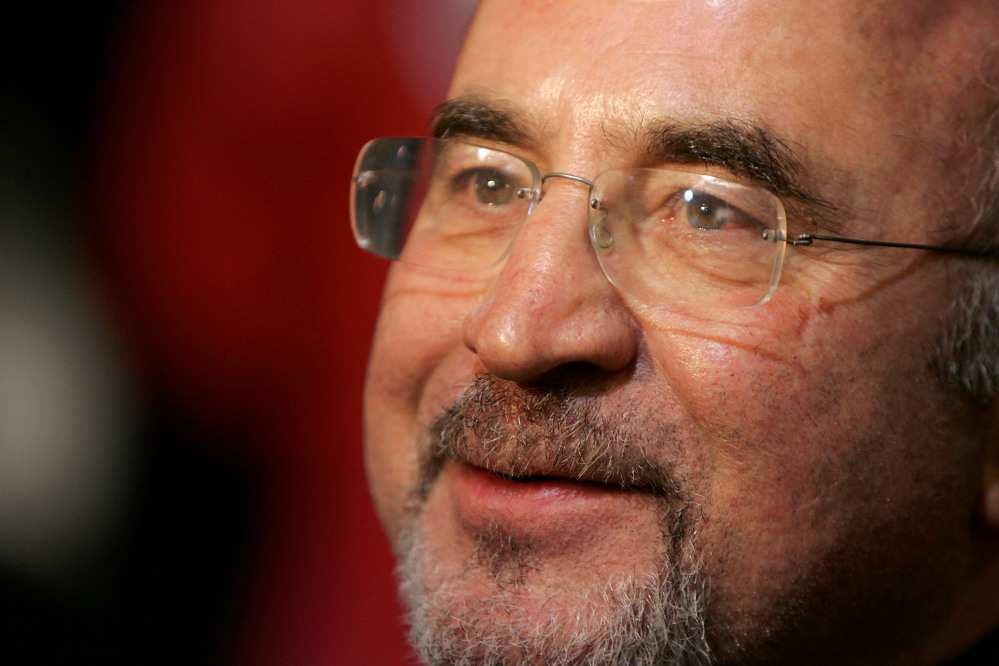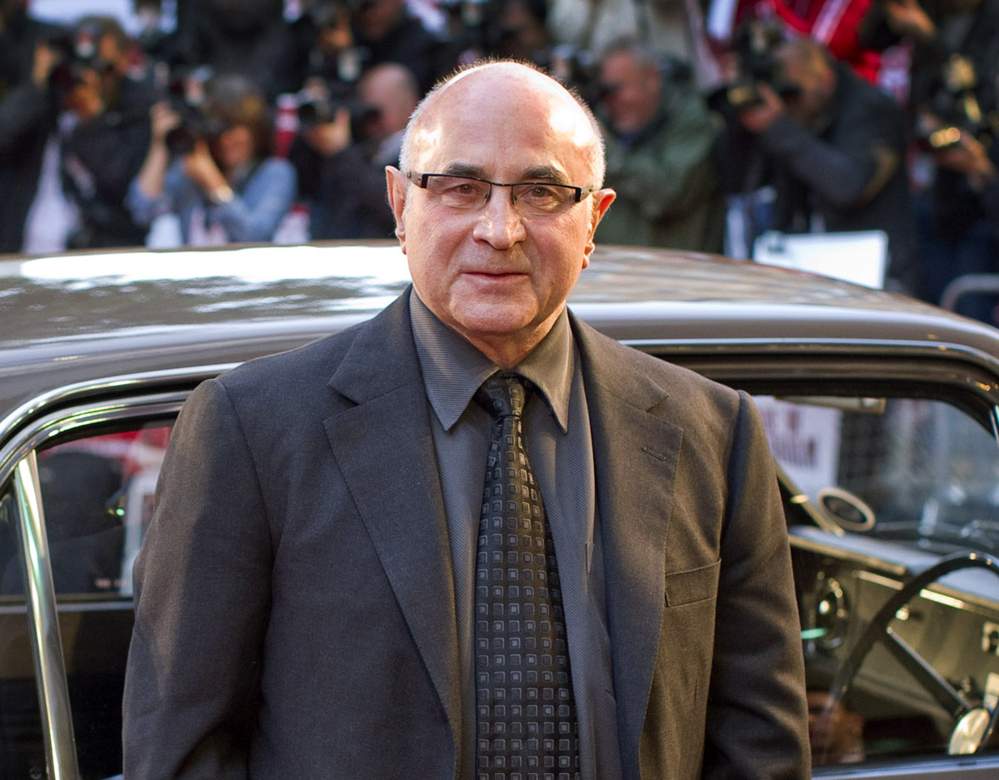LONDON — Bob Hoskins never lost his Cockney accent, even as he became a global star who charmed and alarmed audiences in a vast range of roles.
Short and bald, with a face he once compared to “a squashed cabbage,” Hoskins was a remarkably versatile performer. As a London gangster in “The Long Good Friday,” he moved from bravura bluster to tragic understatement. In “Who Framed Roger Rabbit,” he cavorted with a cast of animated characters, making technological trickery seem seamless and natural.
A family statement released Wednesday said Hoskins had died in a hospital the night before after a bout of pneumonia. He was 71 and had been diagnosed with Parkinson’s disease in 2012.
Helen Mirren, who starred alongside Hoskins in “The Long Good Friday,” called him “a great actor and an even greater man. Funny, loyal, instinctive, hard-working, with that inimitable energy that seemed like a spectacular firework rocket just as it takes off.”
“I personally will miss him very much, London will miss one of her best and most loving sons, and Britain will miss a man to be proud of,” Mirren said.
Hoskins, 5 feet 6 inches tall but built like a bullet, specialized in tough guys with a soft center, including the ex-con who chaperones Cathy Tyson’s escort in Neil Jordan’s 1986 film “Mona Lisa.” Hoskins was nominated for a best-actor Academy Award for the role.
“Mona Lisa” and “Who Framed Roger Rabbit” were “just two of the films that showed Bob Hoskins’ tremendous range,” said Steven Spielberg, who produced “Roger Rabbit” and later directed Hoskins in his Peter Pan tale “Hook.”
“He was an actor who loved to work, and the work loved him. And so did every audience,” Spielberg said.
Hoskins’ breakout Hollywood role was as a detective investigating cartoon crime in “Who Framed Roger Rabbit,” a tribute to hard-boiled 1940s entertainment that was one of the first major movies to meld animation and live action. The 1988 Robert Zemeckis film was a huge global success that won three Oscars and helped revive animated filmmaking.
“For all the special effects and technical wizardry, it was Bob’s honesty and the truth of his performance that made the animated characters believable – and that was a testament to his real talent,” Zemeckis said.
Born in 1942 in eastern England, where his mother had moved to escape wartime bombing, Hoskins was raised in a working-class part of north London. He left school at 15 and worked at odd jobs, including as a circus fire-eater. Hoskins claimed he got his break as an actor by accident – while watching a friend audition, he was handed a script and asked to read.
“I got the lead in the play,” Hoskins told the BBC in 1988. “I’ve never been out of work since.”
Hoskins initially worked in theater, but began getting television and film roles in the 1970s. He came to attention in Britain as star of “Pennies from Heaven,” Dennis Potter’s 1978 TV miniseries about a Depression-era salesman whose imagination sprouts elaborate musical numbers. It was later turned into a movie starring Steve Martin.
His movie breakthrough came in the 1980 thriller “The Long Good Friday,” playing an East End gangster hoping to profit from redevelopment of London’s docks. It contained one of Hoskins’ most memorable speeches, a Cockney-accented dismissal of American culture: “What I’m looking for is someone who can contribute to what England has given to the world: culture, sophistication, genius. A little bit more than an ‘ot dog, know what I mean?”
The film, which also featured a young Pierce Brosnan, is ranked 21 in the British Film Institute’s list of the top 100 British films of the 20th century.
Hoskins worked in films big and small, mainstream and independent. Some were acclaimed, including the factory worker story “Made in Dagenham” and “Last Orders,” a bittersweet portrait of aging that reunited him with Mirren.
Others were panned, such as the limp Spice Girls vehicle “Spice World” and the video game-based dud “Super Mario Bros,” which Hoskins described as his worst film experience.
He appeared in Francis Ford Coppola’s musical “The Cotton Club,” starred alongside Cher in “Mermaids,” played pirate Smee in Spielberg’s “Hook” and was FBI boss J. Edgar Hoover in “Nixon.”
In the World War II thriller “Enemy at the Gates,” starring Jude Law, he played Nikita Khrushchev of the Soviet Union. Law, whose friendship with Hoskins predated the film, recalled him as “a brilliant actor and a very sweet man. Great spirit. And he will be much missed.”
Hoskins told The Guardian in 2010 that acting allowed him “to act out all the feelings and emotions that you shouldn’t have. If I didn’t get rid of it all, I’d be in a terrible state.”
Yet he was famously funny and self-deprecating. Hoskins once recalled how he was put on standby to play Al Capone in Brian De Palma’s “The Untouchables,” until Robert De Niro agreed to take the role. The director sent Hoskins a check for 20,000 pounds to thank him for his time.
“I phoned him up and I said ‘Brian, if you’ve ever got any other films you don’t want me in, son, you just give me a call,’ ” Hoskins said.
In 2012, Hoskins announced that he had been diagnosed with Parkinson’s disease and was retiring from acting.
His last role was as one of the seven dwarves in “Snow White & The Huntsman,” starring Kristen Stewart.
He is survived by his wife, Linda, and children Alex, Sarah, Rosa and Jack. They said in a statement: “We are devastated by the loss of our beloved Bob.”
Send questions/comments to the editors.





Success. Please wait for the page to reload. If the page does not reload within 5 seconds, please refresh the page.
Enter your email and password to access comments.
Hi, to comment on stories you must . This profile is in addition to your subscription and website login.
Already have a commenting profile? .
Invalid username/password.
Please check your email to confirm and complete your registration.
Only subscribers are eligible to post comments. Please subscribe or login first for digital access. Here’s why.
Use the form below to reset your password. When you've submitted your account email, we will send an email with a reset code.